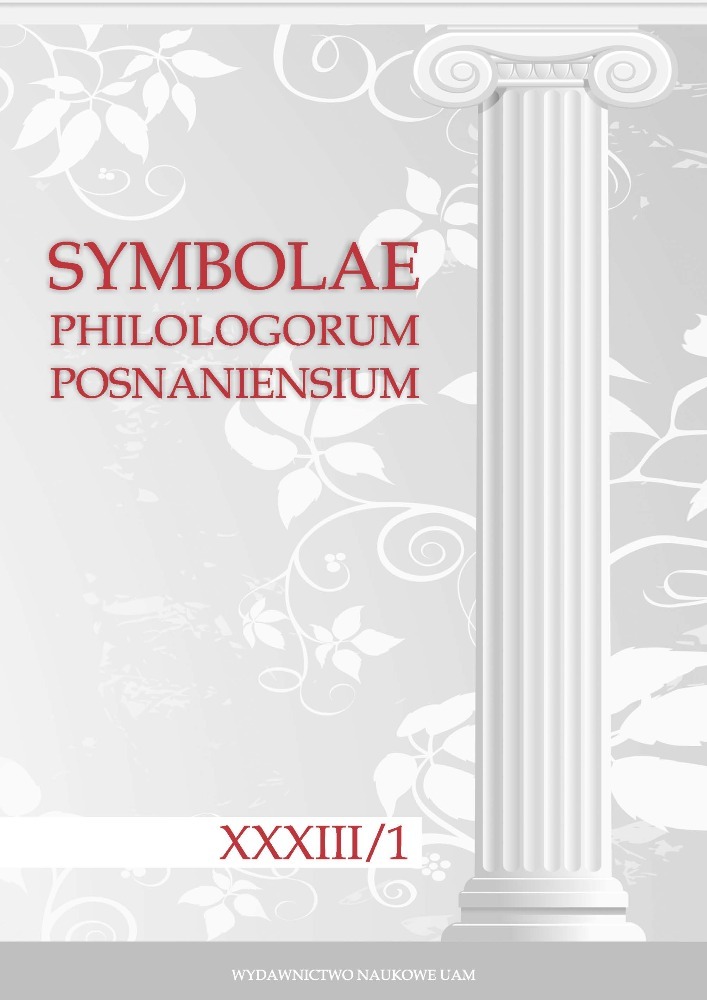Abstrakt
Both Greeks and Romans considered shame an important instrument of moral education. However, while respect for elders and superiors was a desirable trait of young people, it could also turn sometimes into a serious character flaw – excessive compliance with all who made any demands, even the wrong ones. Therefore, shyness was often considered ‘a disease of the soul’ as a feeling that made one feel ashamed to do the right thing. In the article, the concept of vitiosa verecundia is presented on the basis of texts by Seneca, Aristotle, Quintilian, Livy and, above all, Plutarch’s treatise De falso pudore.
Bibliografia
Aristotle, Art of Rhetoric, transl. by J.H. Freese, revised by G. Striker, Cambridge 2020. DOI: https://doi.org/10.4159/DLCL.aristotle-art_rhetoric.2020
Aristotle, Eudemian Ethics, w: Athenian Constitution, Eudemian Ethics, Virtues and Vices, transl. by H. Rackham, Cambridge 1935. DOI: https://doi.org/10.4159/DLCL.aristotle-eudemian_ethics.1935
Aristotle, Nicomachean Ethics, transl. by H. Rackham, Cambridge 1926. DOI: https://doi.org/10.4159/DLCL.aristotle-nicomachean_ethics.1926
Arystoteles, Etyka eudemejska, w: Dzieła wszystkie, t. V, przekł., wstęp i komentarz W. Wróblewski, Warszawa 1996, 385–493.
Arystoteles, Etyka nikomachejska, w: Dzieła wszystkie, t. V, przekł., wstęp i komentarz D. Gromska, Warszawa 1996, 7–300.
Arystoteles, Retoryka, w: Dzieła wszystkie, t. VI, przekł., wstęp i komentarz H. Podbielski, Warszawa 2001, 265–495.
Kwintylian, Kształcenie mówcy, księgi VIII, 6 – XII, przekł., wstęp, i przypisy S. Śnieżewski, Kraków 2012.
Livy, History of Rome, vol. I: Books 1–2, transl. by B.O. Foster, Cambridge 1919. DOI: https://doi.org/10.4159/DLCL.livy-history_rome_2.1919
Plutarch, On Compliancy (De vitioso pudore), w: Moralia, vol. VII, transl. by P.H. De Lacy, B. Einarson, Cambridge 1959, 46–89.
Plutarch, O fałszywym wstydzie, w: Moralia (wybór), przekł., wstęp, przypisy Z. Abramowiczówna, Kraków 1977, 129–150.
Quintilian, The Orator’s Education, vol. V: Books 11–12, ed. and transl. by D.A. Russell, Cambridge 2002. DOI: https://doi.org/10.4159/DLCL.quintilian-orators_education.2002
Seneca, Epistles, vol. I: Epistles 1–65, transl. by R.M. Gummere, Cambridge 1917.
Seneka, Listy moralne do Lucyliusza, przeł. W. Kornatowski, Warszawa1961.
Barton 2001: C.A. Barton, Roman Honor. The Fire in the Bones, Berkeley–Los Angeles–London 2001. DOI: https://doi.org/10.1525/9780520925649
Burns 2015: A. Burns, Diatribe and Plutrach’s practical ethics, Iowa 2015, w: [https://iro.uiowa.edu/esploro/outputs/doctoral/Diatribe-and-Plutarchs-practical-ethics/9983777234002771].
Cairns 1993: D.L. Cairns, AIDŌS. The Psychology of Honour and Shame in Ancient Greek Literature, Oxford 1993.
Ingenkamp 1971: H.-G. Ingenkamp, Plutarchs Schriften über die Heilung der Seele, Göttingen 1971. DOI: https://doi.org/10.13109/9783666251269
Kaster 2005: R.A. Kaster, Emotion, Restraint, and Community in Ancient Rome, Oxford 2005. DOI: https://doi.org/10.1093/acprof:oso/9780195140781.001.0001
Konstan 2003: D. Konstan, Shame in Ancient Greece, „Social Research” 70 (2003), nr 4, 1031–1060. DOI: https://doi.org/10.1353/sor.2003.0007
Konstan 2006: D. Konstan, The Emotions of the Ancient Greeks: Studies in Aristotle and Classical Literature, Toronto 2006. DOI: https://doi.org/10.3138/9781442674370
Konstan 2015: D. Konstan, Senecan Emotions, w: The Cambridge Companion to Seneca, eds. S. Bartsch, A. Schiesaro, Cambridge 2015, 174–184. DOI: https://doi.org/10.1017/CCO9781139542746.016
Nikolaidis 2011: A.G. Nikolaidis, Plutarch’s ‘Minor’ Ethics: Some Remarks on ‘De garrulitate’, ‘De curiositate’, and ‘De vitioso pudore’, w: Virtues for the People: Aspects of Plutarchan Ethics, eds. G. Roskam, L. van der Stockt, Leuven 2010, 205–222. DOI: https://doi.org/10.2307/j.ctt9qdzvk.13
Nussbaum 2009: M. Nussbaum, The Therapy of Desire. Theory and Practice in Hellenistic Ethics, Princeton–Oxford 2009. DOI: https://doi.org/10.1515/9781400831944
O’Neil 1997: E.N. O’Neil, Plutarch on Friendship, w: Greco-Roman Perspectives on Friendship, ed. J.T. Fitzgerald, Atlanta 1997, 105–121.
Stimilli 2005: D. Stimilli, The Face of Immortality. Physiognomy and Criticism, New York 2005.
Sowa 2019: J. Sowa, Obraz przyjaźni w ‘Moraliach’ Plutarcha, „Meander” 74 (2019), 25–40.
Van Hoof 2010: L. van Hoof, Plutarch’s Practical Ethics: The Social Dynamis of Philosophy, Oxford 2010. DOI: https://doi.org/10.1093/acprof:oso/9780199583263.001.0001
Wray 2015: D. Wray, Seneca’s Shame, w: The Cambridge Companion to Seneca, eds. S. Bartsch, A. Schiesaro, Cambridge 2015, 199–211. DOI: https://doi.org/10.1017/CCO9781139542746.019


